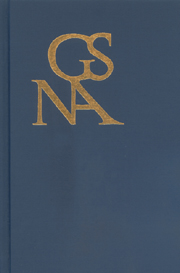Book contents
- Frontmatter
- Contents
- Towards a German Romantic Concept of the Ballad: Goethe's “Johanna Sebus” and Its Musical Interpretations by Zelter and Reichardt
- “Trübe” as the Source of New Color Formation in Goethe's Late Works Entoptische Farben (1817–20) and Chromatik (1822)
- The Myth of Otherness: Goethe on Presence
- The Transformation of the Law of Nations and the Reinvention of the Novella: Legal History and Literary Innovation from Boccaccio's Decameron to Goethe's Unterhaltungen deutscher Ausgewanderten
- “Hear him! hört ihn!”: Scholarly Lecturing in Berlin and the Popular Style of Karl Philipp Moritz
- Hypochondria, Onanism, and Reading in Goethe's Werther
- Judex! Blasphemy! and Posthumous Conversion: Schiller and (No) Religion
- Esoterik der “Macht, die über uns waltet und alles zum Besten lenkt”: Das Wissen vom Anderen in Goethes Wilhelm Meisters Lehrjahre
- Goethes Fortgepflanztes: Zur Unbegrifflichkeit der Morphologie
- Special Section on Die Entstehung der Neueren deutschen Literaturwissenschaft aus der Goethe-Philologie
- Introduction
- Goethe und Goethe-Philologie als Muster der neugermanistischen Editionswissenschaft: Eine Skizze mit Blick auf literaturwissenschaftsgeschichtliche Kontexte
- “Aus dieser fingierten Welt in eine ähnliche wirkliche versetzt”?: Die Theorie der Autobiografie und ein postmoderner Goethe
- “Man sucht einen Mittelpunkt und das ist schwer und nicht einmal gut”: Figurationen der Verdopplung in Wilhelm Meisters Lehrjahren
- Book Reviews
Introduction
from Special Section on Die Entstehung der Neueren deutschen Literaturwissenschaft aus der Goethe-Philologie
Published online by Cambridge University Press: 05 February 2013
- Frontmatter
- Contents
- Towards a German Romantic Concept of the Ballad: Goethe's “Johanna Sebus” and Its Musical Interpretations by Zelter and Reichardt
- “Trübe” as the Source of New Color Formation in Goethe's Late Works Entoptische Farben (1817–20) and Chromatik (1822)
- The Myth of Otherness: Goethe on Presence
- The Transformation of the Law of Nations and the Reinvention of the Novella: Legal History and Literary Innovation from Boccaccio's Decameron to Goethe's Unterhaltungen deutscher Ausgewanderten
- “Hear him! hört ihn!”: Scholarly Lecturing in Berlin and the Popular Style of Karl Philipp Moritz
- Hypochondria, Onanism, and Reading in Goethe's Werther
- Judex! Blasphemy! and Posthumous Conversion: Schiller and (No) Religion
- Esoterik der “Macht, die über uns waltet und alles zum Besten lenkt”: Das Wissen vom Anderen in Goethes Wilhelm Meisters Lehrjahre
- Goethes Fortgepflanztes: Zur Unbegrifflichkeit der Morphologie
- Special Section on Die Entstehung der Neueren deutschen Literaturwissenschaft aus der Goethe-Philologie
- Introduction
- Goethe und Goethe-Philologie als Muster der neugermanistischen Editionswissenschaft: Eine Skizze mit Blick auf literaturwissenschaftsgeschichtliche Kontexte
- “Aus dieser fingierten Welt in eine ähnliche wirkliche versetzt”?: Die Theorie der Autobiografie und ein postmoderner Goethe
- “Man sucht einen Mittelpunkt und das ist schwer und nicht einmal gut”: Figurationen der Verdopplung in Wilhelm Meisters Lehrjahren
- Book Reviews
Summary
In der Wissenschaftsgeschichte der Germanistik wurde bereits in unterschiedlichen Zusammenhängen die Goethe-Philologie als Paradigma für die Theorie- und Methodenentwicklung in der Literaturwissenschaft insgesamt beschrieben. Nicht ausreichend aufgearbeitet ist indes, dass die Neugermanistik im 19. Jahrhundert nicht nur aus der Goethe-Philologie heraus entstanden, sondern ihre disziplinäre Gestalt noch bis in die Gegenwart hinein von diesen Entstehungsbedingungen geprägt ist. Bei einzelnen Segmenten der wissenschaftlichen Terminologie—wie etwa bei den Gattungsbegriffen oder bei Begriffen wie “Symbol”—ist evident, dass wichtige Grundbegriffe noch der heutigen (deutschen) germanistischen Wissenschaftssprache nicht ohne Rekurs auf Goethe zu defi nieren sind. Eher verdeckt wird durch solche punktuellen begriffsgeschichtlichen Evidenzen der Umstand, dass die Literaturwissenschaft ihre Grundbegriffe und damit zentrale Elemente ihrer Wissenschaftssprache insgesamt systematisch aus Goethes Schriften bezog. Diese ursprünglich intentionale Vermischung von Objekt- und Metasprache ist ursächlich für zentrale systematische Probleme der Germanistik als moderner analytischer Wissenschaft.
Nicht nur auf dieser Ebene der Terminologie und der Begriffsgeschichte, sondern auch in der disziplinären Struktur der Germanistik insgesamt und bei den interdisziplinären Anschlüssen dienten Goethe und die Struktur seines Werks den germanistischen “Gründervätern” wie Wilhelm Scherer als Maßstab und Orientierung. Scherers unvollendet gebliebener Versuch der Begründung einer empirischen Ästhetik verdankt sich zumindest einer doppelten Optik: einerseits der Aufnahme von Impulsen der seinerzeit avanciertesten Wissenschaften und Theorien wie der Entwicklungsbiologie und der Nationalökonomie, andererseits aber stets dem Seitenblick auf Goethe und auf die Verflechtung unterschiedlicher disziplinärer Perspektiven in dessen Werk.
- Type
- Chapter
- Information
- Goethe Yearbook 19 , pp. 213 - 214Publisher: Boydell & BrewerPrint publication year: 2012



